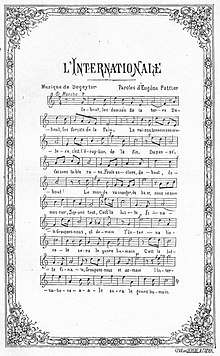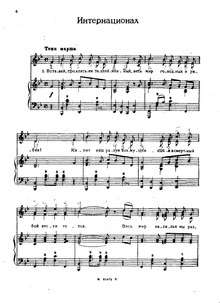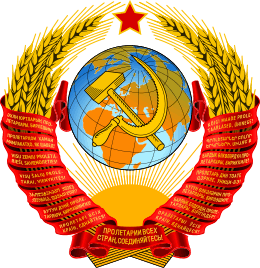The Internationale
"The Internationale" (French: "L'Internationale") is a left-wing anthem. It has been a standard of the socialist movement since the late nineteenth century, when the Second International adopted it as its official anthem. The title arises from the "First International", an alliance of workers which held a congress in 1864. The author of the anthem's lyrics, Eugène Pottier, an anarchist, attended this congress.[1][2]
 "L'Internationale", original French version | |
International anthem of
| |
| Also known as | L'Internationale (French) |
|---|---|
| Lyrics | Eugène Pottier, 1871 |
| Music | Pierre De Geyter, 1888 |
| Adopted | 1890 |
| Audio sample | |
"The Internationale" (instrumental)
| |
The original French refrain of the song is C'est la lutte finale / Groupons-nous et demain / L'Internationale / Sera le genre humain. (English: "This is the final struggle / Let us group together and tomorrow / The Internationale / Will be the human race."). "The Internationale" has been translated into many languages.
"The Internationale" has been celebrated by anarchists, communists, socialists, democratic socialists, and social democrats.[3][4]
In 1912–44, the Internationale was used as an anthem of the Bolshevik Party, the Soviet Russia and the Soviet Union when it was replaced with the more Soviet-centric Hymn of the Soviet Union. It was also used as a national anthem by the Chinese Soviet Republic, Bavarian Soviet Republic, Slovak Soviet Republic, and Hungarian Soviet Republic.
The Internationale is one of the most universally translated anthems in history.[5]
Copyright
The original French words were written in June 1871 by Eugène Pottier (1816–1887, previously a member of the Paris Commune)[6] and were originally intended to be sung to the tune of "La Marseillaise".[7] In 1888 Pierre De Geyter (1848–1932) set the earlier lyrics to a new melody, composed especially for Pottier's lyrics.[8] De Geyter's melody was first publicly performed in July 1888,[9] and soon thereafter Pottier's lyrics became closely associated with, and widely used with, De Geyter's new melody. Thus "The Internationale" gained an identity that was entirely distinct, and no longer in any way directly tied to the French national anthem, the Marseillaise.
In a successful attempt to save Pierre De Geyter's job as a woodcarver, the 6,000 leaflets printed by Lille printer Bolboduc only mentioned the French version of his family name (Degeyter). In 1904, Pierre's brother Adolphe was induced by the Lille mayor Gustave Delory to claim copyright, so that the income of the song would continue to go to Delory's French Socialist Party. Pierre De Geyter lost the first copyright case in 1914, but after his brother committed suicide and left a note explaining the fraud, Pierre was declared the copyright owner by a court of appeal in 1922.[10]
In 1972 "Montana Edition", owned by Hans R. Beierlein, bought the rights to the song for 5,000 Deutschmark, first for the territory of West Germany, then in East Germany, then worldwide. East Germany paid Montana Edition 20,000 DM every year for its rights to play the music. Pierre De Geyter died in 1932, causing the copyrights to expire in 2002.[11] Luckhardt's German text is public domain since 1984.
As the "Internationale" music was published before 1 July 1909 outside the United States of America, it is in the public domain in the United States.[12] As of 2013, Pierre De Geyter's music is also in the public domain in countries and areas whose copyright durations are authors' lifetime plus 80 years or less.[13] Due to France's wartime copyright extensions (prorogations de guerre), SACEM claimed that the music was still copyrighted in France until October 2014.[14]
As Eugène Pottier died in 1887, his original French lyrics are in the public domain. Gustave Delory once acquired the copyright of his lyrics through the songwriter G. B. Clement having bought it from Pottier's widow.[15]
Original French lyrics
| French | Literal English translation |
|---|---|
Debout, les damnés de la terre |
Stand up, damned of the Earth |
Translations into other languages
German Translation
The German version, "Die Internationale", was used by East German anti-Stalinists in the failed 1953 uprising and again during the 1989 protests which nonviolently toppled Communism in East Germany. When numerous East Germans were arrested for protesting the 40th anniversary celebrations for the GDR, many of them sang the Internationale in police custody to imply that they, rather than their captors, were the real revolutionaries.
Luckhardt's version, the standard German translation, of the final line of the chorus tellingly reads: "Die Internationale erkämpft das Menschenrecht". (The Internationale fights for human rights.) In 1989, this was coupled with the chant: "Volkspolizei, steh dem Volke bei" (People's police, stand with the people!)
Here follows the most known version, the 1910 translation by Emil Luckhardt:
| 1910 version (by Emil Luckhardt) | |
|---|---|
| German | Literal English translation |
Wacht auf, Verdammte dieser Erde, Auf zum letzten Gefecht! |
Wake up, wretched of this Earth On to the last fight! |
Russian Translation
The Russian version was initially translated by Arkady Kots in 1902 and printed in London in Zhizn, a Russian émigré magazine. The first Russian version consisted of three stanzas (as opposed to six stanzas in the original French lyrics, and based on stanzas 1, 2 and 6) and the refrain. After the Bolshevik Revolution in Russia, the text was slightly re-worded to get rid of "now useless" future tenses – particularly the refrain was reworded (the future tense was replaced by the present, and the first person plural possessive pronoun was introduced). In 1918, the chief-editor of Izvestia, Yuri Steklov, appealed to Russian writers to translate the other three stanzas and in the end, the song was expanded into six stanzas.[16] On 15 March 1944, the Soviet Union adopted the "Hymn of the Soviet Union" as its national anthem. Prior to that time, "The Internationale" served as the principal musical expression of allegiance to the ideals of the October Revolution and the Soviet Union (the "Internationale" continued to be recognized as the official song of the Communist Party of the Soviet Union, and the post-1919 Soviet version is still used by the Communist Party of the Russian Federation). The full song is as follows:
| English: The Internationale | |
|---|---|
 | |
Anthem of the the the | |
| Lyrics | Аркадий Коц (Arkady Kots), 1902 |
| Music | Pierre De Geyter, 1888 |
| Published | 1902 |
| Relinquished | 1944 |
| Succeeded by | Государственный гимн Советского Союза (State Anthem of the Soviet Union) |
| Audio sample | |
The Internationale, Russian
| |
| Russian translation | Transliteration (GOST) | Literal English translation |
|---|---|---|
Вставай, проклятьем заклеймённый, |
Vstavaj, prokljatjem zaklejmjonnyj, |
Stand up, ones who are branded by the curse, |
English Translations
The traditional British version of "The Internationale" is usually sung in three verses, while the American version, written by Charles Hope Kerr with five verses, is usually sung in two.[17][18] The American version is sometimes sung with the phrase "the internationale", "the international soviet", or "the international union" in place of "the international working class". In English renditions, "Internationale" is sometimes sung as /ɪntərnæʃəˈnæli/ rather than the French pronunciation of [ɛ̃tɛʁnasjɔnal(ə)].
Billy Bragg was asked by Pete Seeger to sing "The Internationale" with him at the Vancouver Folk Festival in 1989. Bragg thought the traditional English lyrics were archaic and unsingable (Scottish musician Dick Gaughan[19] and former Labour MP Tony Benn[20] disagreed), and composed a new set of lyrics.[21] The recording was released on his album The Internationale along with reworkings of other socialist songs.
| British version (by Eugène Pottier) | American version (by Charles Hope Kerr) | Billy Bragg version |
|---|---|---|
|
|
|
Chinese Translation
"The Internationale" in Chinese (simplified Chinese: 国际歌; traditional Chinese: 國際歌; pinyin: Guójìgē), literally the "International Song", was first translated on 15 June 1923 from the French original by Qu Qiubai (Chinese: 瞿秋白),[24] a leading member of the Communist Party of China in the late 1920s. His translation has transliterated "The Internationale" as Yīngdénàxióngnà'ěr (simplified Chinese: 英德纳雄纳尔; traditional Chinese: 英德納雄納爾) when singing the phrase in Standard Chinese. As he was executed by the Kuomintang in 1935, his Chinese translation is in the public domain wherever the duration of copyright is an author's lifetime plus up to 70 years, including Chinese-speaking Mainland China, Hong Kong, Macau, Taiwan (lifetime plus 50 years in these places), and Singapore (lifetime plus 70 years). The three stanzas of this version roughly correspond to the three stanzas of Arkady Kots' Russian version and the first, second, and sixth French lyrics by Eugène Pottier. The third, fourth and fifth stanzas of the French original are not used in this version.
| Traditional Chinese | Simplified Chinese | Pinyin | Literal English translation |
|---|---|---|---|
起來,饑寒交迫的奴隸, |
起来,饥寒交迫的奴隶, |
Qǐ lái, jī hán jiāo pò de nú lì, |
Arise, slaves afflicted by hunger and cold, |
Xiao San's version
This version was translated from the Russian version in 1923 by the poet Xiao San, friend of Mao Zedong. This version is the most common and is also the anthem of the Communist Party of China.[23] Xiao's version was a revision of Qu's translation, which did not see widespread use due to it being written in Classical Chinese,[22] although the phrase "The Internationale" was similarly transliterated as Yīngtènàxióngnài'ěr (simplified Chinese: 英特纳雄耐尔; traditional Chinese: 英特納雄耐爾). When the Chinese Soviet Republic was established in 1931, it was decided to be its national anthem.[25] The version was officially revised in 1962 by China National Radio and Chinese Musicians' Association.[23][24]
The song was a rallying anthem of the demonstrators at the Tiananmen Square protests of 1989, and was repeatedly sung both while marching to the Square and within the Square.
...many hundreds of people (not only students) appeared on the street. They ran after the trucks and shouted protest slogans. A few stones were thrown. The soldiers opened fire with live ammunition. The crowd threw themselves on the ground, but quickly followed the convoy again. The more shots were fired, the more the crowd got determined and outraged. Suddenly they started singing "The Internationale"; they armed themselves with stones and threw them towards the soldiers. There were also a few Molotov cocktails and the last truck was set on fire.[25]
| Traditional Chinese | Simplified Chinese | Pinyin | Literal English translation |
|---|---|---|---|
起來,饑寒交迫的奴隸, |
起来,饥寒交迫的奴隶, |
Qǐ lái, jī hán jiāo pò de nú lì, |
Arise, slaves afflicted by hunger and cold, |
National Revolutionary Army version
When commemorating the 55th anniversary of the Paris Commune on 18 March 1926, the National Revolutionary Army printed a music sheet with three lyrics of "The Internationale" in Chinese, roughly corresponding to the first, second, and sixth French lyrics by Eugène Pottier. When singing refrain twice after each lyric, "The Internationale" is transliterated first as Yīngtè'ěrlāxióngnà'ěr (Chinese: 英特爾拉雄納爾) and second as Yīngtè'ěrnàxióngnà'ěr (Chinese: 英特爾納雄納爾).
| Traditional Chinese | Simplified Chinese | Pinyin | Literal English translation |
|---|---|---|---|
起來飢寒交迫的奴隸, |
起来饥寒交迫的奴隶, |
Qǐlái, jīhánjiāopò de núlì, |
Arise, slaves afflicted by hunger and cold, |
Shen Baoji's version
The third, fourth, and fifth French stanzas are not sung in Chinese in the above two versions of Qu and the National Revolutionary Army. Chinese translator Shen Baoji (simplified Chinese: 沈宝基; traditional Chinese: 沈寶基, 1908–2002) has made a complete Chinese translation, published in 1957, of all six French stanzas. Shen's translation has transliterated "The Internationale" as Yīngdāi'ěrnàxī'àonà'ěr (simplified Chinese: 因呆尔那西奥纳尔; traditional Chinese: 因呆爾那西奧納爾) in the stanzas, different from the transliterations of Qu and the National Revolutionary Army. As the Copyright Law of the People's Republic of China grants individuals copyright for their lifetime plus 50 years, Shen's translation is expected to remain copyrighted there until the end of 2052.
Other Chinese Translations
In addition to the Mandarin version, "The Internationale" also has Cantonese[26] and Taiwanese Hokkien[27] versions, occasionally used in Hong Kong and Taiwan. The word "Internationale" is not translated in either version.
Filipino Translation
There were three Filipino versions of the song. The first was composed by Juan Feleo of the Partido Komunista ng Pilipinas-1930 under the title "Pandaigdigang Awit ng Manggagawa" (The International Worker's Anthem) which was translated from the English version. The second version was a retranslation of the first two stanzas on the basis of the French original by the Communist Party of the Philippines. The third version, which introduced the third stanza, was derived from both Chinese and French versions and translated by Jose Maria Sison, the CPP's founding chairman.[28]
| PKP-1930 Version | 1969 CPP Version | 2016 CPP Version |
|---|---|---|
|
Bangon sa pagkakagupiling |
Bangon sa pagkakabusos |
Bangon sa pagkakabusos |
Other Translations
- Versions of the song in South Asian languages, particularly Bengali and Malayalam, have existed since the time of colonial rule. It was translated into Bengali by the national poet of Bangladesh, Kazi Nazrul Islam, and subsequently by Bengali singer Hemanga Biswas. The Assamese version was translated by the poet Bishnu Rabha. The Malayalam version of the song has existed since the 1950s with the translation of the song for the people of the Indian state of Kerala by actor and social activist Premji for the united Communist Party of India (CPI). Pakistani musical group Laal performed a version of this anthem in their translation.
Popular references
- Both in Soviet poet Yevgeny Yevtushenko's 1961 poem Babiyy Yar as well as composer Dmitri Shostakovich's symphony incorporating its text, the Internationale is referenced: "Let the Internationale thunder, when the last anti-Semite on Earth is buried forever!".[29]
- In the 1965 film The East Is Red, produced the year prior to the Cultural Revolution, the song is performed at the film's opening and in the very last scene.
- In Federico Fellini's 1973 film Amarcord, the song is played on gramophone as part of a cruel prank to get an innocent person arrested by Fascists in 1930s Italy.
- In Warren Beatty's 1981 film Reds, the song is sung by protesting workers in Moscow, over a montage of scenes depicting the Russian Revolution.
- In the 1994 film In the Heat of the Sun (阳光灿烂的日子) by Chinese director Jiang Wen, the song plays loudly over a brutal scene where the main character, Ma Xiaojun, repeatedly beats an innocent victim to a state of bloodied unconsciousness. The film is set during the Cultural Revolution (1966–1976), when "The Internationale" was played at official events and at the end of each day's radio broadcast.[30]
- Ken Loach used the Spanish version of this song in his 1995 movie Land and Freedom, set during the Spanish Civil War.[31]
- In 1997 film Air Force One, the song is sung loudly when General Ivan Radek is released.
- The song played during the film The Beautician and the Beast.
- A Music box version of the song can be heard at the start and end of the music video for the Manic Street Preachers 1998 single If You Tolerate This Your Children Will Be Next[32]. The song deals with the topic of the Spanish Civil War and Anti-fascism in general. The single peaked at number 1 in the UK Singles Chart, the band's first single to do so[33].
References
- Nic Maclellan. Louise Michel: Rebel Lives. Ocean Press. pp. 7, 89.
- Donny Gluckstein. "Decyphering 'The Internationale'".
- World Book Encyclopedia, 2018 ed., s.v. "Internationale, The"
- "The International Anarchist Congress, Amsterdam, 1907" (PDF). www.fdca.it. Retrieved 7 December 2018.
- http://www.sovmusic.ru/english/list.php?gold=no&category=inter&part=1
- Gill 1998, 1st paragraph.
- David Walls. "Billy Bragg's Revival of Aging Anthems: Radical Nostalgia or Activist Inspiration?". Sonoma State University.
- Gill 1998, 9th paragraph.
- Gill 1998, 11th paragraph.
- Gill 1998.
- "Ich habe die Kommunisten bezahlen lassen", Die Welt, Hans R. Beierlein, 2014-04-18.
- Peter B. Hirtle. "Copyright Term and the Public Domain in the United States". Archived from the original on 4 July 2012.
- Year 1932 when Pierre De Geyter died, plus 80 years, would get to year 2012.
- Vulser, Nicole (8 April 2005). "Siffloter 'L'Internationale' peut coûter cher". Le Monde (in French). Retrieved 7 December 2015.
- Gill 1998, 16th paragraph.
- A. V. Lunacharskiy (ed.). "The International (in Russian)". Fundamental'naya Elektronnaya Biblioteka.
- David Walls. "Billy Bragg's Revival of Aging Anthems: Radical Nostalgia or Activist Inspiration?". Sonoma State University.
- "The Internationale" in 82 languages
- Gaughan, Dick. "The Internationale". Dick Gaughan's Song Archive.
I can see no more point in trying to 'modernise' it than I would in repainting the Cistine [sic] Chapel or rewriting Shakespeare's plays.
- Tony Benn (2014). A Blaze of Autumn Sunshine: The Last Diaries. Arrow Books. p. 129. ISBN 978-0-09-956495-9.
- Billy Bragg – Internationale on YouTube, from the Pete Seeger 90th Birthday Concert (The Clearwater Concert) at Madison Square Garden, May 3, 2009.
- ""国际歌"中文译配版权属瞿秋白 在中国最早公开唱". culture.people.com.cn. Retrieved 7 December 2018.
- "重读《国际歌》感言". www.yhcqw.com. Yanhuang Chunqiu. Retrieved 28 November 2018.
- "《国际歌》中文译词的演变 – 中国共产党新闻 – 中国共产党新闻网". cpc.people.com.cn. Retrieved 28 November 2018.
- Amnesty International, 30 August 1989. Preliminary Findings on Killings of Unarmed Civilians, Arbitrary Arrests and Summary Executions Since 3 June 1989, p. 19
- "Archived copy". Archived from the original on 12 June 2004. Retrieved 12 June 2004.CS1 maint: archived copy as title (link)
- "Archived copy". Archived from the original on 18 January 2006. Retrieved 18 January 2006.CS1 maint: archived copy as title (link)
- "The Internationale In Filipino". Josemariasison.org. Retrieved 25 October 2018.
- Yevtushenko, Yevgeny. "Babi Yar." 1961. The Collected Poems 1952–1990 by Yevgeny Yectushenko. pp.1-3.
- Braester, Yomi (2001). "Memory at a standstill: 'street-smart history' in Jiang Wen's In the Heat of the Sun". Screen. 42 (4): 350–362.
- Soundtrack, Land and Freedom, IMDb
- "Manic Street Preachers - If You Tolerate This Your Children Will Be Next".
- "Manic Street Preachers".
External links
- The Internationale (2000 documentary) on IMDb
- Another large collection of downloadable recordings
- "The Internationale": lyrics and tabs
- "The Internationale" in a minor mode by the Prolétariat Mondial Organiseyyy on YouTube (in French)
- Downloadable recordings in more than 40 languages
- Piano arrangements and orchestral MIDI file of "The Internationale"
- Lyrics of this song at MetroLyrics
- IWW Version, translated by Charles Kerr from The Little Red Songbook London, 1916



